Remembering Funmilayo Ransome-Kuti: Nigeria’s ‘lioness of Lisabi’
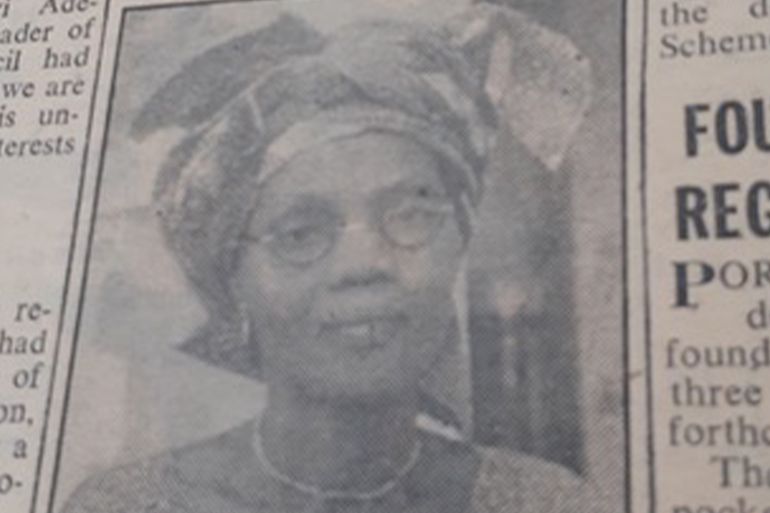
On February 18, 1977, approximately 1,000 soldiers stormed a compound in Lagos. It belonged to the famed Afrobeat musician and critic of Nigeria’s military government, Fela Kuti.
During the raid, Kuti’s 76-year-old mother, Funmilayo Ransome-Kuti, was thrown from a second-storey window. She sustained injuries from which she never recovered and died at the General Hospital in Lagos on April 13, 1978.
Keep reading
list of 4 itemsTop New York court overturns Harvey Weinstein’s 2020 rape conviction
Cass Review: Feminists accused of being ‘unkind’ have been vindicated
Ten years after Chibok girls kidnapping: One woman’s struggle to move on
At least two Nigerian news outlets reported her death with the headline: “Fela’s Mum is Dead.”
But Ransome-Kuti was not just “Fela’s mum”. The anti-colonial activist and feminist was, in many ways, the mother of the nation.

‘No taxation without representation’
Venerable Victor Sotunde, now 88 and a retired priest from the Anglican Communion of Abeokuta in western Nigeria, remembers Ransome-Kuti from his days as a young boarding student at Abeokuta Grammar School. Her husband, Reverand Israel Oludotun Ransome-Kuti, was the school’s principal and the couple lived on the premises with their children.
“During morning devotion at school assembly, we saw her come downstairs with her towel always over her left shoulder, walk past us to go to the bathroom,” he recalled. “We could tell her husband, our principal, didn’t like it because it was also during his inspection of students.
“She was well-known to us youngsters, as the leader of the Abeokuta Women’s Union (AWU),” Sotunde explained. “Due to her activism, she was given the traditional title of “Beere”, which is usually bestowed on female leaders, and translates as ‘first of equals’.”
Under British colonial indirect rule, Nigeria had been divided into 24 provinces. For administrative reasons, each province comprised divisions and districts. Abeokuta province in southern Nigeria had two divisions – Egba and Egbado, which were divided into smaller districts. Each division and district was administered by a Sole Native Authority (SNA). Abeokuta town, where Ransome-Kuti was from, was the administrative headquarters for Egba division.
As the leader of the AWU, in the years before Nigeria declared independence from Britain in 1960, Ransome-Kuti often spoke to British district officials to explain her organisation’s position – best captured by their slogan “no to taxation without representation”. At the meetings, she would speak in the Yoruba language, leaving officials scrambling for an interpreter.
Ransome-Kuti railed against what she said were unfair taxes levied on small traders – many of whom were women, who she led in colourful campaigns. After one victory over water rates in 1959, the Daily Times of Nigeria reported that thousands of supporters of the Federation of Nigerian Women’s Union (NWU) – which had formed out of the AWU – danced around Abeokuta town.
The celebration had been triggered by the deferment of a proposed scheme in which women in Egba division would be asked to pay two shillings for water, while those in the districts paid one. This was too much for most women, who were either petty traders or unemployed.
It was Ransome-Kuti’s latest victory in what was widely regarded as a war to end the unfair taxes imposed by the colonial government and implemented through the SNA. The SNA was headed by the traditional ruler of Abeokuta, Oba (Sir) Ladapo Ademola II.
Resistance
The women’s revolt against taxation had been rumbling for more than a decade before the water rate victory.
In 1918, tax policies had been introduced that required women as young as 15, (the age at which they were considered marriageable) including those who were unemployed, to pay three shillings a year as income tax. Men, on the other hand, did not have to pay it until they were 18.
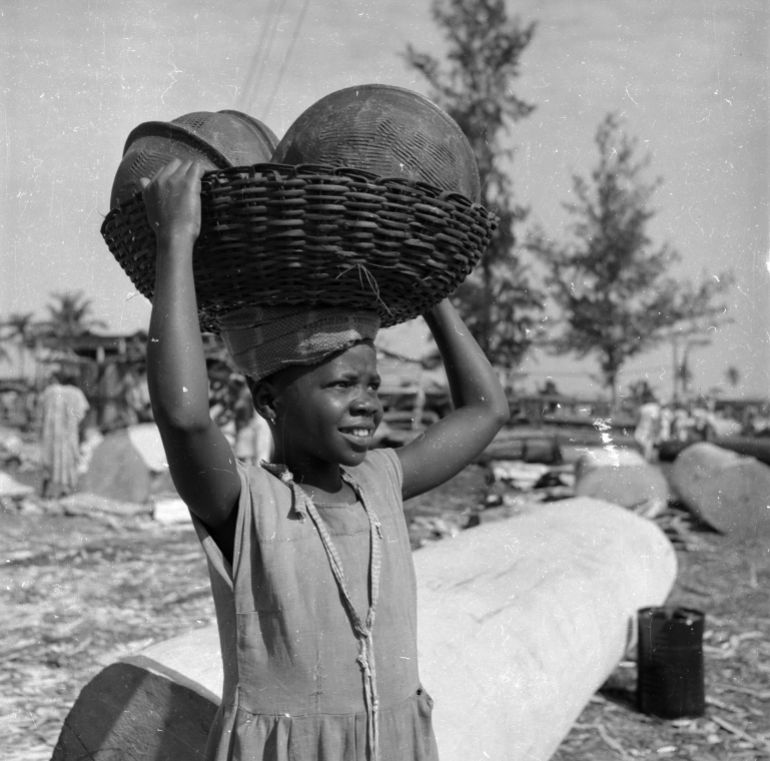
It was said government agents went about raiding homes and stripping girls of their clothes in order to assess their age for the purpose of taxation and, as the work was based on commission, extortion and abuse were rife.
Ransome-Kuti formed the AWU in 1946 to “defend, protect, preserve and promote the social, economic, cultural and political rights and interests of the women in Egbaland”.
Her aims and objectives were outlined in a document in 1947, called The AWU’s Grievances, one of the sub-headings in which was “Stripped Naked”. It contained a list of wrong-doings by the traditional ruler for “misusing his authority” and by the administration for “not providing medical and educational facilities for women”.
A food price control policy had also been introduced by the colonial government during the second world war which, in addition to the tax, further hurt female petty traders. When they could not pay, their goods or produce were often seized by agents working on behalf of the SNA.
After several years of complaints, the women mobilised under the leadership of Ransome-Kuti, and in December 1947, laid siege to the palace of Oba Ademola II, where they chanted war songs day and night, to demand the suspension of the tax.
Ransome-Kuti became known around the country for her activism. She had regular speaking engagements on women’s rights both at home and overseas and toured her region, raising awareness about women’s political and voting rights.
How it all began
Born on October 25, 1900, Ransome-Kuti attended the co-educational Abeokuta Grammar School, where she was the first female student to enrol.
In 1919, she went to Britain to study at Wincham Hall Schools for Girls in Cheshire, where she was taught subjects such as French, elocution, music and dress-making. But before she returned to Nigeria in 1922, she demonstrated the first sign of her rejection of British imperialism: Dropping her Christian names of Frances Abigail and adopting her Yoruba name – Oluwafunmilayo (shortened to Olufunmilayo or Funmilayo), meaning “God has given me joy”.
In 1925, she married Israel Oludotun Ransome-Kuti, an educationist and co-founder of the Nigerian Teachers Union. The couple had four children – Dolupo, Olikoye, Olufela (Fela) and Beko – and worked as teachers.
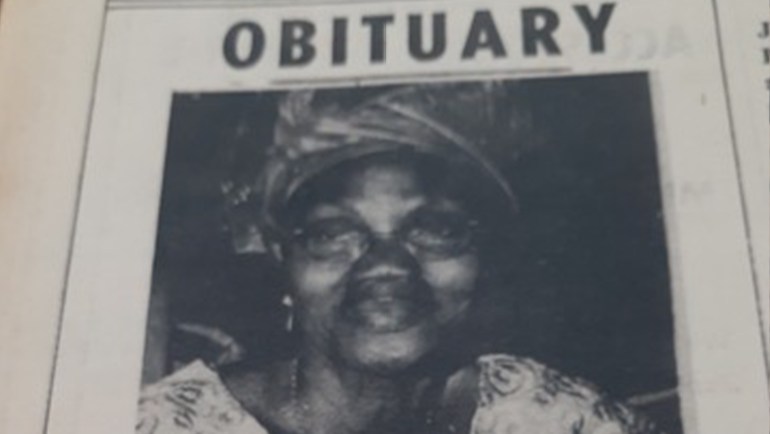
Iyalode Alaba Lawson, a community elder who became the first female president of the Abeokuta Chambers of Commerce, as well as of the National Association of Chambers of Commerce, Industry, Mine and Agriculture (NACCIMA), remembers Ransome-Kuti as a “disciplinarian” at school. “The students who were older than us always said ‘Mrs Kuti’s class is strict’,” she recalled.
“My father was also a student at the school and we heard them talk about the Ransome-Kutis and their brand of discipline. Though I was very young, I saw her drive a car and, as a woman in Abeokuta in those days, it was an unusual sight for us as young girls. Many of us took her as a role model because she walked with so much authority and was always dressed in our traditional clothes.”
‘Lioness of Lisabi’
It was, however, the 1943 “Great Weep” and 1948 tax revolt, which earned Ransome-Kuti the title “Lioness of Lisabi” (Lisabi being the traditional hero of the Egba people) in the press.
The “Great Weep” episode saw women shed tears over the burden of income tax. According to a March 1959 report in South Africa’s Drum magazine: “Thousands of Abeokuta women went about shedding tears. The Alake (the title of the traditional ruler, Oba Ladapo Ademola II) and the authorities could do nothing to stop it, and gave way to the women’s demands.”
In December 1947, Ransome-Kuti’s husband arranged a meeting of men from Abeokuta town, during which they decided to support the demands of their wives and urged the traditional ruler to explore other ways of generating revenue.
The meeting and the prolonged siege of his palace forced Oba Ademola II to act. He suspended the taxation of women and went into exile in Osogbo, a town more than 200km (124 miles) away.
In March 1959, Ransome-Kuti told Drum: “So we gave a hell of a time to the chiefs, the government, to all those who were responsible for the systematic pauperisation of the mass of the people.”
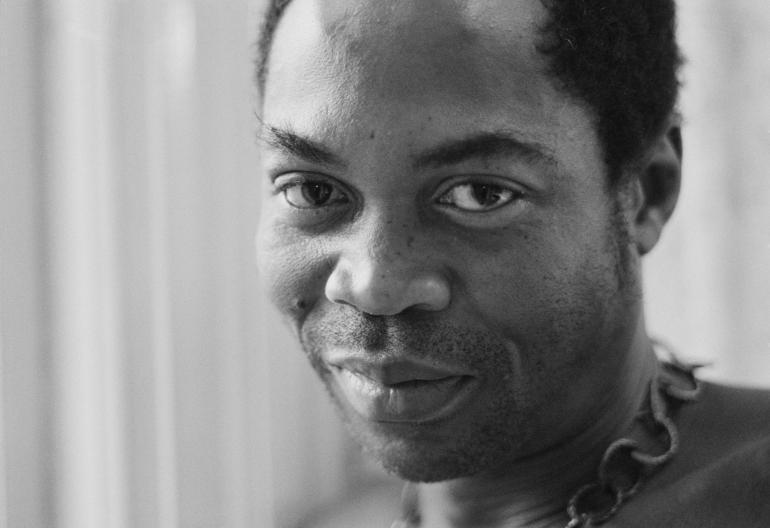
‘We had equality till Britain came’
But there was no doubt as to where Ransome-Kuti laid the blame for the plight of Nigerian women. “We had equality till Britain came,” she wrote in an article published in the British communist newspaper, The Daily Worker.
In it, she noted that before the British arrival in Nigeria, life was mainly agricultural and there was a fairer division of labour between men and women: “The men cultivated the land and it was chiefly the duty of women to reap. Women owned property, traded and exercised considerable political and social influence in society. They were responsible for crowning the Kings on Coronation days. Whatever disabilities there (existed) were endured by men and women alike. With the advent of British rule, slavery was abolished, and Christianity introduced into may parts of the country, but instead of the women being educated and assisted to live like human beings their condition deteriorated.”
In pre-colonial societies and kingdoms, women occupied prominent positions in public administration and decision-making. But, with the arrival of male colonial administrators and civil servants, women were sidelined from their previous roles.
In 1947, Nnamdi Azikiwe of the National Council of Nigeria and the Cameroons (NCNC), who would later become Nigeria’s first president, invited Ransome-Kuti to travel to Britain to meet the secretary of state, Sir Arthur Creech Jones. She was the only woman in the seven-person delegation when she triumphantly boarded the Almanzora, which set sail from Lagos on June 26.
The purpose of their visit was to discuss the limitations of the 1946 Richards Constitution with British colonial officials. Named after Nigeria’s governor-general, Sir Arthur Richards, it was the successor legal framework to the 1922 Clifford Constitution and was meant to ensure a better representation of Nigerians in the administration of the country.
One of the main objectives of the Constitution was to “secure greater participation by Africans in the discussion of their own affairs”. But it did not extend electoral representation to women and left the regulations on male-only suffrage just as they were in the previous Constitution.
Furthermore, the Executive Council was still populated with British officials with only one Nigerian as an unofficial member. Thus the administration and decision-making in effect remained in the hands of the colonial government. This and other constitutional matters formed the crux of the delegation’s mandate to Britain.
After their return, despite some reports of disagreements among the delegation, Ransome-Kuti told the Nigerian Spokesman Newspaper at a reception held for them, the trip “turned out to be money and time well-used, since the people’s side of the case, for once, had been presented. I had an exciting time, sometimes three appointments in a day and before I left spoke with factory workers”.
In 1949, Ransome-Kuti was nominated by citizens to represent Abeokuta at the provincial level of the General Constitutional Conference, which was scheduled to take place in January 1950. The aim of the conference was to collate the views of all Nigerians as part of a nationwide discussion on a new constitution. Ransome-Kuti was the only woman to deliberate on the proceedings at the provincial level on what ultimately became known as the 1951 MacPherson Constitution.
‘She who must be obeyed’
But not everyone agreed with Ransome-Kuti’s activities and her opponents found willing allies in the male-owned press.
The Nigerian Tribune newspaper once called the AWU the “Terrorist Women’s Union of Abeokuta”. The same newspaper featured the headlines: Mrs F Kuti Must Be Checked, and That Woman Again.
One article about the AWU, entitled Women May Seize Power stated: “There is growing suspicion that the women of Abeokuta mean to seize power and to bring the country absolutely under their own control, a large number of people are opposed to this idea and are urging that early steps be taken to end this move. Abeokuta is going the wrong way. Soon there will be a She-Who-Must-Be-obeyed.”
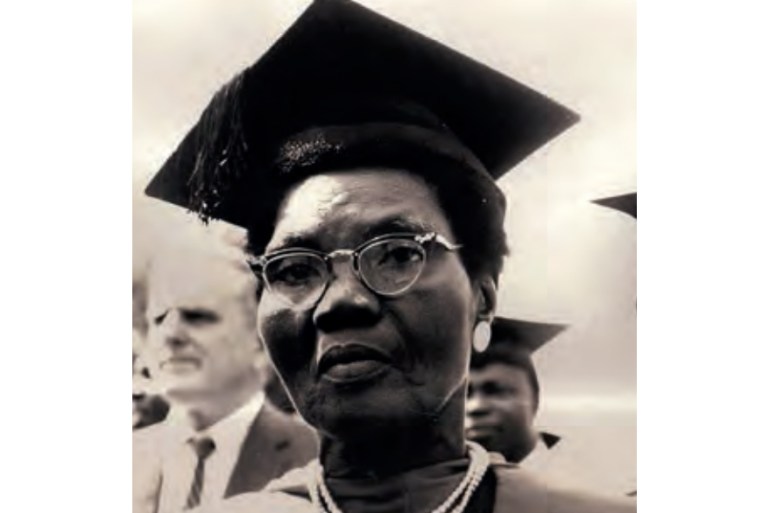
The content of some of the articles barely concealed the resentment of their male authors. The editorial leader entitled The Women are Ambitious, published in the Nigerian Tribune on February 11, 1950, stated: “It is gratifying to note that there is deep resentment among the Egba men of this dangerous ambition of their women. They and they alone can stop it; and it is necessary that they stop it, not only because of the loss of prestige in allowing their women to overwhelm them.”
According to an article by Nelson Ottah in 1959, which was published in Nigeria: The Birth of Africa’s Greatest Country, other sections of the press showed a more grudging acceptance of women’s activism under the leadership of Ransome-Kuti, describing them as “the petticoat fighters who had shown they were a force to be reckoned with”.
Oba Ademola II, who had returned to his throne in 1950 after 28 months in exile, shared his views on Ransome-Kuti with Drum in 1959: “There is no satisfying Mrs Ransome-Kuti. Right now, she is up to another devilry. She is opposed to women of Abeokuta paying water rates. I am sure that if she would devote as much time to agitating for progressive measures as she does to everything that is conducive to disorder, she would become the greatest woman in Abeokuta, nay in Nigeria.”
Of the tax protests which led to his abdication, he added: “I could not hate Mrs Ransome-Kuti then and I cannot hate her now, although she continues to cause me a great deal of trouble because, I suppose, I admire her guts. My only regret is that she is using her guts wrongly. With a bit of more level-headedness, there is nothing the little woman couldn’t do for Abeokuta and for Nigeria.”
‘Communist leanings’
In 1958, the Nigerian government used Ransome-Kuti’s Daily Worker article from more than 10 years earlier, along with trips she had taken to China and the Soviet Union to speak about the plight of Nigerian women, as grounds to refuse to renew her passport. She had “communist leanings”, the government argued, and might spread communist messages to other women.
Then-Prime Minister Alhaji Abubakar Tafawa Balewa said: “I myself, I am convinced that communism is an evil thing and I have no sympathy for any Nigerian who knowingly or unknowingly, allows herself to be used for spreading its doctrines.”
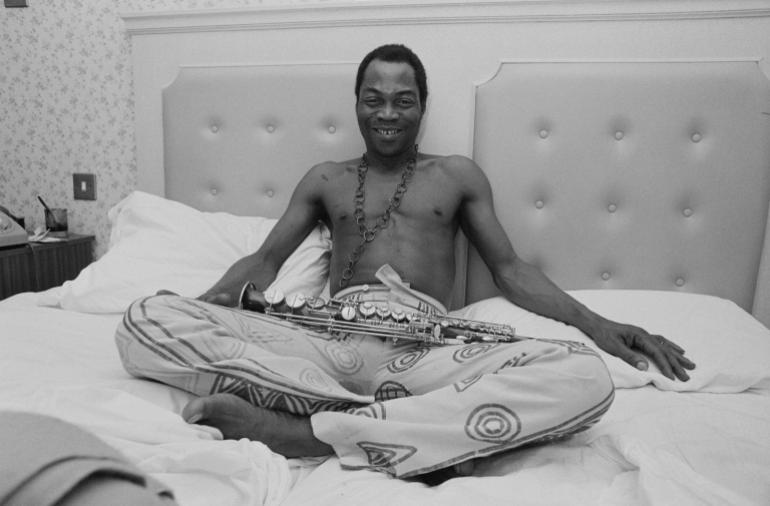
Ransome-Kuti was unperturbed and during the 1959 Drum interview explained: “I was shocked and amused. Why should I be suspected of being pink or red?”
She also faced the prospect of prison when, in March 1959, a court in Abeokuta charged her with three counts of “inciting women against water rate payment”.
The case was adjourned until later in the month, but Ransome-Kuti was immediately rearrested and charged with five further counts of the same offence.
She was given a sentence of a five-pound fine or three months imprisonment. She refused to pay the fine but still eluded jail. When members of the press asked her how she had done this, her reply was: “The authorities saw the belligerent air of my women followers, they panicked and ordered my release.”
With the dust barely settled on the court case, Ransome-Kuti announced she was going “to stand for election this year and to fight the government of Northern Nigeria into giving the franchise to the women of Northern Nigeria”.
Bitter electoral experiences
In 1951, the MacPherson Constitution had expanded the right to vote, but it was only applied in southern Nigeria. The north still maintained its taxpayers-only voting policy, which Ransome-Kuti described as being designed to “eliminate women from the whole show because there were only few women who could afford to pay income tax”.
The electoral regulations also stipulated a three-step system of voting – primary, intermediate and final electoral colleges.
Ransome-Kuti stood in the primaries for a federal parliamentary seat and won, but was later knocked out at the intermediary level of the controversial three-level electoral college.
She tried to run a second time but was thwarted by the NCNC party’s apparatchik, which preferred its male incumbent.
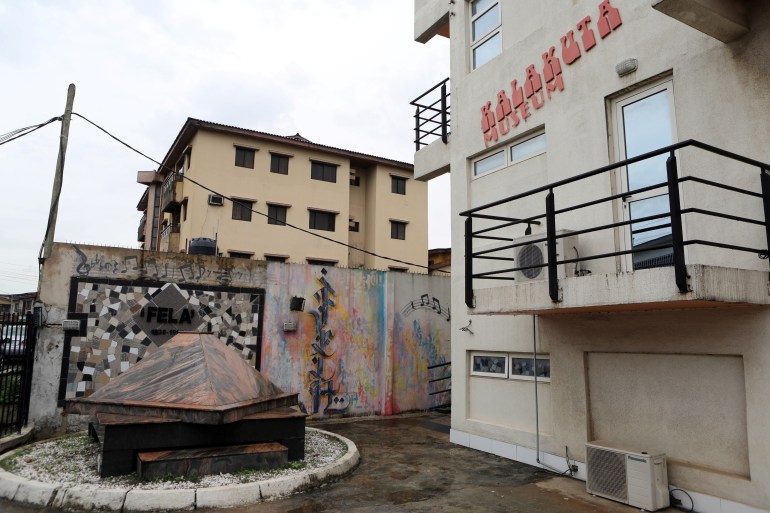
Her credentials as a grassroots mobiliser, advocate for women’s suffrage and an internationally acclaimed activist were not sufficient to convince the party she could win an election.
Ransome-Kuti reportedly responded: “Men do not want women to take part in our legislation; they want women as mere voters, ordinary election tools.”
Undeterred, she quit the NCNC party that same year and registered her own, the Commoners’ People’s Party. On December 12, 1959, she stood in the federal elections for a seat in the Federal House of Representatives. She came a distant third with 4,665 votes after Action Group and NCNC candidates who scored 10,443 and 9,755 votes respectively. The number of votes she won, however, still pointed to her significance within the community.
Her loss at the ballot box did not dampen her passion for advocating for universal adult suffrage and women’s rights in northern Nigeria.
That same year, as president of the Federation of Nigerian Women’s Societies, she met with the governor-general, Sir James Robertson, to press for franchise for northern women. They finally secured it in 1976.